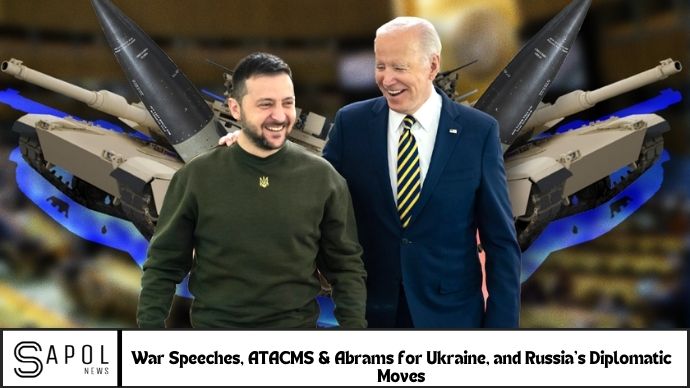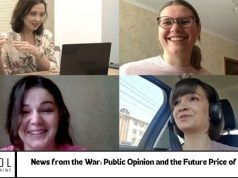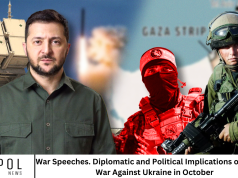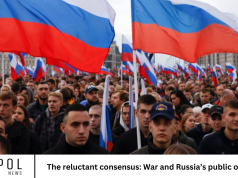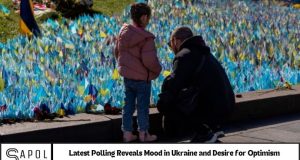War Speeches, ATACMS & Abrams for Ukraine, and Russia’s Diplomatic Moves In the ongoing conflict between Ukraine and Russia, international diplomatic and military developments are shaping the global response. As the war intensifies, Western countries are significantly ramping up support for Ukraine, with new military aid packages including ATACMS missiles, Abrams tanks, and artillery supplies. Meanwhile, Russia continues to manipulate international platforms like the UN Charter to justify its actions and distance itself from accountability. As these dynamics unfold, the global community is navigating complex political alliances, shifting loyalties, and the future of international law. This article takes a closer look at recent developments, including the Ramstein meeting, Zelensky’s visits to the US and Canada, and the UN General Assembly debates, alongside Russia’s tactics in undermining diplomatic efforts.
Key Military Assistance for Ukraine: Strengthening Defenses
During the week of September 18–24, a new wave of military support for Ukraine was announced, including air defense systems, tanks, armored vehicles, and a potential delivery of ATACMS long-range missiles. This new assistance is crucial as Ukraine continues its defense against Russian aggression.
- ATACMS Missiles: These precision-guided missiles offer Ukraine the ability to strike targets deep within Russian-occupied areas, changing the dynamics on the battlefield.
- Abrams Tanks and Artillery: Countries like Germany, Denmark, and Sweden are sending additional armored vehicles and artillery shells, enhancing Ukraine’s ability to defend against Russian forces.
- IT and Cyber Support: In addition to traditional military aid, a coalition involving Estonia, Luxembourg, Belgium, Denmark, and others is focusing on improving Ukraine’s cybersecurity and communications, critical elements for modern warfare.
Countries such as the US, Canada, Germany, and Denmark are also providing tank reinforcements, including Leopard 1, T-72, and Stridsvagn 122 tanks, as well as drones and trucks to ensure operational efficiency on the ground.
Diplomatic Developments: UN General Assembly and Russia’s Manipulation
The high-level sessions of the 78th UN General Assembly were marked by significant speeches and debates on the ongoing war.
- Support for Ukraine’s Territorial Integrity: World leaders reaffirmed their support for Ukraine’s territorial integrity. President Joe Biden of the United States stated that Russia is solely responsible for the war and could end it immediately by ceasing aggression.
- Zelensky’s Call for a “Just Peace”: President Volodymyr Zelensky of Ukraine urged the UN to back Ukraine’s peace plan and criticized Russia’s unyielding position. He reminded the assembly that the global community must hold Russia accountable for its actions, including the deportation of Ukrainian children and its energy and food blackmail.
However, Sergei Lavrov, Russia’s foreign minister, continued to twist the UN Charter and argued that Ukraine’s territorial integrity is no longer valid due to the so-called “coup” that ousted former President Yanukovych, positioning the Russian invasion as a corrective measure.
- Russian “Peace” Proposals: Lavrov reiterated Russia’s position, rejecting any proposals for a ceasefire. The Russian delegation promoted an unacceptable ultimatum-like peace plan, demanding territorial concessions from Ukraine and a non-bloc status for the country.
Ukraine’s Diplomatic Push and Russia’s Loss of Allies
On the diplomatic front, Ukraine’s President Zelensky made visits to both the US and Canada, urging continued support for his country’s defense efforts.
- Financial Assistance: Zelensky met with US lawmakers and President Joe Biden to push for an additional $24 billion in military aid. Biden’s administration also promised to provide a $325 million assistance package, which included critical artillery and air defense systems.
- Canada’s Support: In addition to military supplies, Canada committed to long-term defense assistance, with half a billion USD allocated for Ukraine’s defense needs.
Meanwhile, Russia has faced diplomatic setbacks, including its failure to intervene in Armenia’s conflict with Azerbaijan. Russia’s inaction allowed Azerbaijan to carry out a successful military operation in Nagorno-Karabakh, revealing Russia’s declining influence in the region.
Russia’s Unstable Alliances: Armenia and Georgia
Russia’s diplomatic troubles are not limited to its relationships with NATO countries. Armenia and Georgia, former allies, have grown disillusioned with Russia’s actions.
- Armenia’s Conflict with Azerbaijan: Russia’s failure to support Armenia in its conflict with Azerbaijan over Nagorno-Karabakh highlighted the weakness of Russia’s role as a regional peacekeeper.
- Georgia’s Political Turmoil: Meanwhile, in Georgia, accusations surfaced that Ukraine was involved in attempts to destabilize the government. Georgia’s ruling party even initiated the impeachment of the country’s pro-European president.
In both cases, Russia’s reluctance to honor its commitments has led to a deterioration of these key alliances, further isolating the country.
May you also like it:
Ukrainian Opinion Survey Tracks Fluctuating Views on Quick End to War
Ukrainian Public Opinion on Compromise with Russia Changing, Researcher Explains
Diplomacy Watch: Ukrainian Public Opinion More Divided Than Ever
Conclusion
The war in Ukraine has become a pivotal issue not only for Ukraine and Russia but for the entire international community. Western countries are increasing their military aid to Ukraine, while Russia is intensifying its diplomatic efforts to manipulate international law and avoid accountability.
- Global Support for Ukraine remains strong, as evidenced by the US, Canada, and EU pledges. The ATACMS missiles, Abrams tanks, and other military aid packages are crucial in giving Ukraine the strength to resist Russian forces.
- Russia’s Manipulation of the UN Charter to justify its invasion has raised concerns among the international community about the future of global diplomacy and security.
As the situation continues to evolve, Ukraine’s peace plan and diplomatic efforts will remain a central focus, while Russia’s weakening alliances and questionable peace proposals will continue to challenge the international order.
FAQs
1. What military aid is Ukraine receiving from Western countries?
Ukraine is receiving various military supplies, including ATACMS long-range missiles, Abrams tanks, Leopard tanks, armored vehicles, and artillery shells. These are crucial to enhancing Ukraine’s defensive capabilities against Russian aggression.
2. What is the importance of the UN General Assembly in the Ukraine conflict?
The UN General Assembly provides a global platform for leaders to discuss the war, with countries reaffirming support for Ukraine’s territorial integrity. It also allows Ukraine to present its peace plan, while Russia manipulates international law to justify its invasion.
3. How has Russia reacted to Ukraine’s calls for peace?
Russia, through Foreign Minister Sergei Lavrov, has rejected any ceasefire proposals and presented an unacceptable ultimatum-style peace plan. Russia insists that its actions are justified due to the alleged “coup” in Ukraine and claims it is protecting Russian-speaking populations.
4. What happened with Russia’s alliances in Armenia and Georgia?
Russia’s failure to support Armenia in the Nagorno-Karabakh conflict with Azerbaijan has strained relations. Additionally, Ukraine was accused of interfering in Georgia’s internal politics, leading to a presidential impeachment. These issues reflect Russia’s declining influence in the region.
5. What has President Zelensky’s international outreach achieved?
During visits to the US and Canada, President Zelensky secured significant military and financial commitments, including a $24 billion aid request and a $325 million defense package from the US. Canada also pledged half a billion USD for Ukraine’s long-term defense needs.
6. How is the UN Security Council addressing the war?
The UN Security Council is paralyzed due to Russia’s veto power. Ukraine has called for reforms to overcome this deadlock, suggesting the General Assembly be given more authority to combat aggression and pass preventive sanctions.

